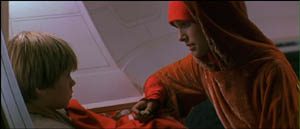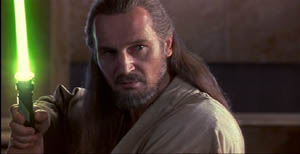|
Well, this sure as hell must've been the most eagerly awaited film since little Billy, age ten, drew the sequel to "Guy Punching Other Guy" in the margins of his science textbook and flipped the pages past the stunned faces of his classmates in some fifth grade class in the late nineteenth century. The first Star Wars film in sixteen years also had a lot of fan expectation to live up to, without which it probably would've fared quite a bit better in the end.  After all the hoopla, the critics couldn't wait to start picking at nits, and pick they did. Some even went so far as to invent some nits that weren't even there and then pick at those, as well, which wasn't altogether fair, or even particularly necessary. There were enough real issues with the film that a heavily-weighted diatribe could easily be coaxed out of what was honestly there. The first time I saw it, it seemed to be lacking somewhat, though the exact problem was something I couldn't precisely put my finger on. I saw it again that weekend with a larger group, and felt like I "got it" on the second try. No, it wasn't as good as the old Star Wars. But it was fun, and had awesome effects, and the lightsaber fight was the best yet, and Natalie Portman was entirely too young to look at so I didn't in the finest tradition of well-adjusted and responsible citizenship, and the CG was the best in any movie at that time, and I couldn't get too upset about the downside. It was an enjoyable film, and frankly it was much preferable to concentrate on the positive than to pick apart all its missteps. I do, after all, go to see movies hoping to like them (unless they're crap like Feeders, where I specifically hope for the worst film possible.) So I cut The Phantom Menace some slack. The first few scenes, in fact, are so inimitably Star Warsian that you'd think you were just watching missing scenes from Return of the Jedi, albeit with the best stop-motion robots ever seen. This, then, would be the part where you expect me to go off on how Jar Jar Binks is the worst thing to strike the planet earth since that asteroid that wiped out all the dinosaurs, but you're not going to get that sort of hyperbolic overreaction. This is not to say that the first time I saw his introductory scene that I didn't feel a sudden smack of "Whoa! That's a little...excessive, maybe? Over the top? Or perhaps simply shrill?" because I did. But in subsequent viewings, the character became less of a distraction for the most part. I'm not of the decidedly overpopulated camp that believes that Jar Jar ruined the movie, or that anything ruined the movie, as such. But it can be little argued that pushing the screwball comedy aspect as much as it did was a bad decision, and not because of fan backlash. Star Wars has always had a good dose of humor, just never in such broad and seemingly unending spates. Sometimes it felt appropriate, but at others it simply undercuts the drama, which tends to make most of the comedy feel downright unwanted. What Lucas had described as a potentially risky move didn't pay off for him, and he spent much of the next film overcompensating for that error and making a whole rash of new ones.  Any misgivings about the story completely fail to apply to the visuals. The Phantom Menace is like an entire candy store poured into your eyes. There's so much casual beauty floating about here that it only makes the narrative issues that much less ingratiating. The film seems at war with itself in some ways, by having a dreamlike scene of a captivating underwater city made up of what look like giant glass lanterns linked together, just to then turn around and drop in a fart joke. We have a classical Greco-Roman city, and we have Jar Jar stepping in a pile of shit. When did George Lucas start embracing the entertainment possibilities of the ass so wholeheartedly? There's a fast-as-hell three-way lightsaber fight that's truly impressive intercut with Jar Jar getting knocked in the nads (really, it's mostly stuff that happens to Jar Jar, and not things he himself does, that seem to make his bits so tiresome.) Did no one on his gargantuan production staff have the guts to tell Lucas to his face that the crude body humor needed to be surgically excised for the good of the whole picture, or did he simply not listen? It's hard not to notice the fact that the original trilogy benefited from the talents of other screenwriters and directors in addition to Lucas; now that he's becoming more of a one-man show, I start to wonder if maybe he was always the weakest link in the chain. The film clearly wants to walk up with its tail a-wagging and entertain us; it's so joyful in itself that it's possible to overlook the chaff and just play tunnel-vision with the good parts. Lucas knows how to put exciting visuals in front of us; it's in the area of directing actors that he falls short. Most of the cast have done better work in other projects-well, actually, Liam Neeson does a perfectly fine job here, which is just as well, as he's the center of attention, if not the center of the story. But there's some shaky work by some of the others. Natalie Portman was a serious emote-a-thon in The Professional when she was only twelve, so why does she seem so stiff here? Perhaps part of the prob is that Padme/Amidala is just not a terribly interesting character compared to Star Wars's previous leading lady, though she is, by all accounts from much younger guys who have no needling pangs of conscience about saying so, very very cute. The fact is that the most distinctive (and quotable) character in the new cast is Jar Jar, whether people like him or, as is mostly the case, not. Neeson's Qui-Gon Jinn is a likeable enough fellow, but we don't get to keep him, and with Anakin aging ten years between this and the next film, we don't get to keep our cast, really, which makes it all the more difficult to get a grip on these characters and their story.  Star Wars on the whole has never been terribly complicated, and Phantom Menace tries to shove in a whole massive tonnage of stuff in its course, leading to some bits of confusion. Sorry if I'm wrecking the surprise for the two people out there who still don't realize that Palpatine and Darth Sidious are the same guy, but seeing as his plan to get voted into chancellorship wouldn't have been possible had not Amidala escaped, we have to wonder what exactly his original plan about her signing a treaty with the Trade Federation was supposed to be about (and since it failed, we'll probably never know.) There's some rather superfluous bits of big fish eating each other that look great but don't really have a point (beyond the foreshadowing inherent in "There's always a bigger fish.") And suddenly there's a heaping side order of quasi-religious crap appended to the concept of The Force, an idea whose very name connotes a very genericised view on mysticism. Suddenly an inverted allegory of Christianity, we get a virgin birth legend, which has to sit side-by-side with a pointless and implausible attempt at making The Force a scientific concept, as well. Science and magic don't at all mix well, largely because the first is real and the second is not, and it adds nothing story-wise to try and do so. Some liberal pruning would've served this movie well (and many people tried it on their own) in getting it away from the childish humor, unexplained motives, and needless religiosity. And while they're hypothetically at it, they can shear out lousy advice such as "Feel, don't think," which is a truly awful notion to foist off on anyone. Lucas was clearly excited by his long-awaited revisit to the world he created, and we can feel that enthusiasm bleeding through in scenes like the Podrace, the numerous smackdowns the Jedi lay upon the hapless battle droids, and the hyperactive multi-front final battle he basically recycled from Return of the Jedi. But the story he's telling this time around is somewhat less compelling or even clear in intent. Are we really supposed to feel fault towards a nine-year-old boy for being afraid to lose his mother? Judging by the second film in the new trilogy, apparently we were, and the fact that I can't makes me have serious reservations about where this will all end up and why. Philosophical differences hardly made any rifts between me and the first three films, but I find it hard to get behind the ideas he's throwing at us this time around. Maybe I just can't stomach hearing a monstrously rich and litigious man attempting to elucidate upon the evils of materialism and greed. We'll wait and see. -review by Matt Murray
|
|
||||||||